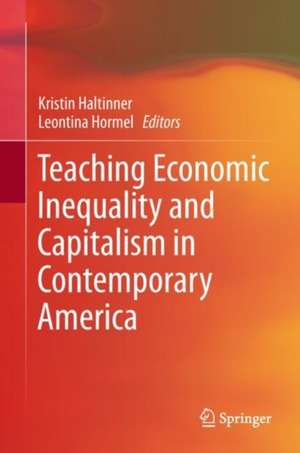Teaching Economic Inequality and Capitalism in Contemporary America
Editat de Kristin Haltinner, Leontina Hormelen Limba Engleză Hardback – 16 ian 2018
| Toate formatele și edițiile | Preț | Express |
|---|---|---|
| Paperback (1) | 644.95 lei 6-8 săpt. | |
| Springer International Publishing – 6 iun 2019 | 644.95 lei 6-8 săpt. | |
| Hardback (1) | 651.34 lei 6-8 săpt. | |
| Springer International Publishing – 16 ian 2018 | 651.34 lei 6-8 săpt. |
Preț: 651.34 lei
Preț vechi: 766.28 lei
-15% Nou
Puncte Express: 977
Preț estimativ în valută:
124.65€ • 129.40$ • 103.94£
124.65€ • 129.40$ • 103.94£
Carte tipărită la comandă
Livrare economică 22 martie-05 aprilie
Preluare comenzi: 021 569.72.76
Specificații
ISBN-13: 9783319711409
ISBN-10: 3319711407
Pagini: 518
Ilustrații: VII, 380 p. 5 illus.
Dimensiuni: 155 x 235 mm
Greutate: 0.72 kg
Ediția:1st ed. 2018
Editura: Springer International Publishing
Colecția Springer
Locul publicării:Cham, Switzerland
ISBN-10: 3319711407
Pagini: 518
Ilustrații: VII, 380 p. 5 illus.
Dimensiuni: 155 x 235 mm
Greutate: 0.72 kg
Ediția:1st ed. 2018
Editura: Springer International Publishing
Colecția Springer
Locul publicării:Cham, Switzerland
Cuprins
Part I: Making the Personal Political: The Stories of Capitalism.- Chapter 1. ‘Teaching Naked’ in Late Capitalism: Personal Narratives and Classroom Self-Disclosure as Pedagogical Tools.- Chapter 2. Untold Stories: Bringing Class into the Classroom.- Chapter 3. ‘Self-Made’ Success on the Private Dole: An Illustration of the Reproduction of Capitals.- Chapter 4. Financial Stumbles, Consumer Bankruptcy, and the Sociological Imagination.- Part II: Making Marxist Theory Real.- Chapter 5. Capitalism 101: Teaching First-Year Students How to View the Social World through the Lens of Marxist Theory.- Chapter 6. Teaching Global Inequality through the World of Commodities.- Chapter 7. Radical Pedagogical Homesteading: Returning the ‘Species’ to Our ‘Being’.- Chapter 8. Socialist Grading.- Part III: Applied Pedagogical Strategies for Course Development.- Chapter 9. Overcoming Students’ Fear: Scaffolding to Teach “Money and Society”.- Chapter 10. Capitalism in the Classroom: Confronting the Invisibility of Class Inequality.- Chapter 11. Experiencing the Outcomes of Economic Inequality in the Day-to-Day Workings of the Classroom.- Chapter 12. Teaching Economic Inequality and Capitalism in Contemporary America using Resources from the Federal Government.- Chapter 13. Teaching Social Inequality through Analysis of Hidden Assumptions in Non-Academic Publications.- Chapter 14. Participatory Action Research as Problem-Centered Learning: A class study of rural poverty, housing, and environmental justice.- Chapter 15. Inequality and Violence.- Part IV: Intersections: Global and Local.- Chapter 16. Intersectional Marginalities in Rural Teacher Preparation: Teaching beyond “what I am able to see visibly”.- Chapter 17. Economic Inequality and Race: Shifting the Narrative of “No, It can’t be that bad.- Chapter 18. Irreversible Punishment: Teaching about Inequalities in Capital Punishment.- Chapter 19. Making Room for a Postcolonial Critique in the Introductory STS Curriculum.- Chapter 20. Transnational Comparison as a Pedagogical Tool for Illuminating Economic Inequality in the United States.- Part V: Capitalism and Higher Education: Constraints and Opportunities.- Chapter 21. Capitalism and the Cost of Textbooks: the Possibilities of Open Source Materials.- Chapter 22. Writing Against Ideology: Preparing Students to Reclaim Writing as Critical Practice.- Chapter 23. Lessons on Inequality and Capitalism: Perspectives from a Community College.- Chapter 24. Capitalism, Racism, and the Neoliberal University: The Case of the University of Missouri (Mizzou).- Chapter 25. Against the “Institutional Real”: The Structural and Cultural Foundations of Corporate Higher Education and the Challenge to Developing Politically Engaged Students.
Notă biografică
Kristin Haltinner is an Assistant Professor of Sociology at the University of Idaho. Her research is on right-wing ideology and social movement organizations; racial formation and discourse; and social inequality. She has previously conducted research on the Tea Party Patriots and the Minuteman Civil Defense Corps. Her current research projects include a grounded study of climate change skepticism and another on traumatic child birth experiences. Haltinner teaches a variety of classes on topics related to diversity and inequality including: Diversity and Stratification, Racial and Ethnic Relations, and the Sociology of Gender.
Leontina Hormel is an Associate Professor of Sociology at the University of Idaho. Her areas of research and teaching include political economy, community action research, and environmental inequalities. Currently, Leontina is working with a low-income, mobile home park residents whose experiences intersect with environmental justice and rural housing insecurity. She has conducted research with Nez Perce activists in northern Idaho, while other fieldwork has taken her to various parts of Idaho to examine community trust in science. Leontina’s courses include Global Sociology: Gender, Race, and Class Around the World; Economic (In)Justice in the United States; and Environment, Policy, and Justice.
Textul de pe ultima copertă
This book discusses pedagogical solutions that enable students to see how capitalist processes and economic inequalities intersect and shape our assumptions and behaviours. The contributors provide thoughtful reflections on the struggles and opportunities instructors face in teaching about these topics while competing against the invisibility of capitalist forces and prevalent social myths, such as “anyone who works hard can achieve”. This book will not only help instructors empower students to recognize economic injustice and its interaction with capitalist organization, but also develops and acts on transformative solutions. Through analysis of the classed dimensions of the current political, economics, and cultural climate, as well as presenting novel lesson plans and classroom activities, this book is of great value for college and university professors.
Caracteristici
Features thoughtful reflections on teaching about economic inequality and capitalism by pioneers in the field Presents in-depth, critical analyses of the current pedagogical and theoretical challenges facing educators as well as the importance of the contemporary study of gendered politics Offers successful strategies for teaching important concepts through case studies and active learning exercises Includes supplementary material: sn.pub/extras
